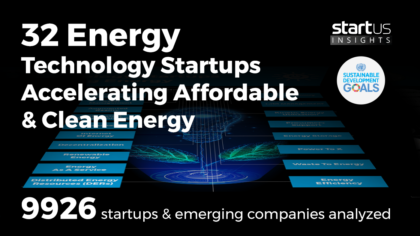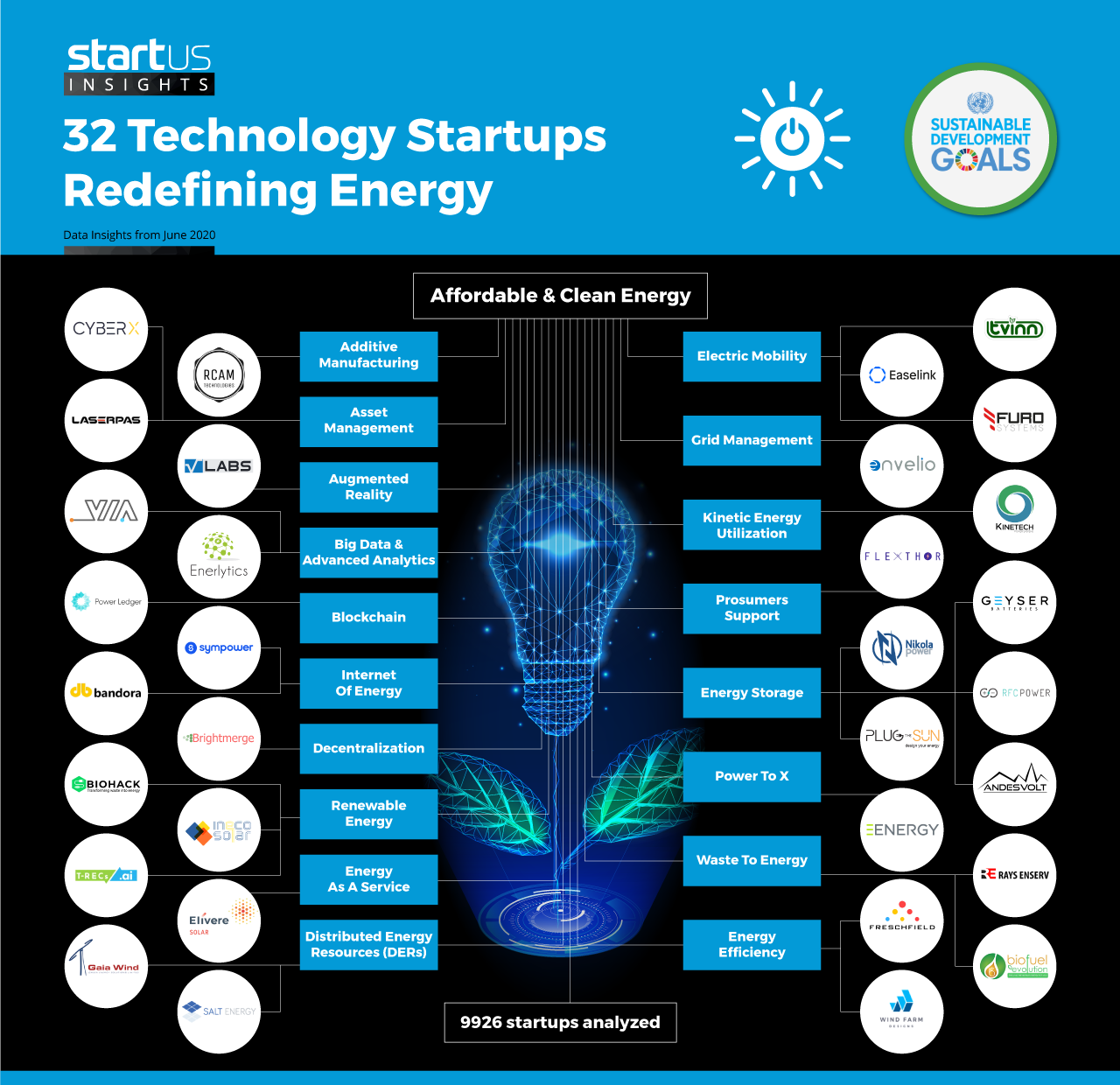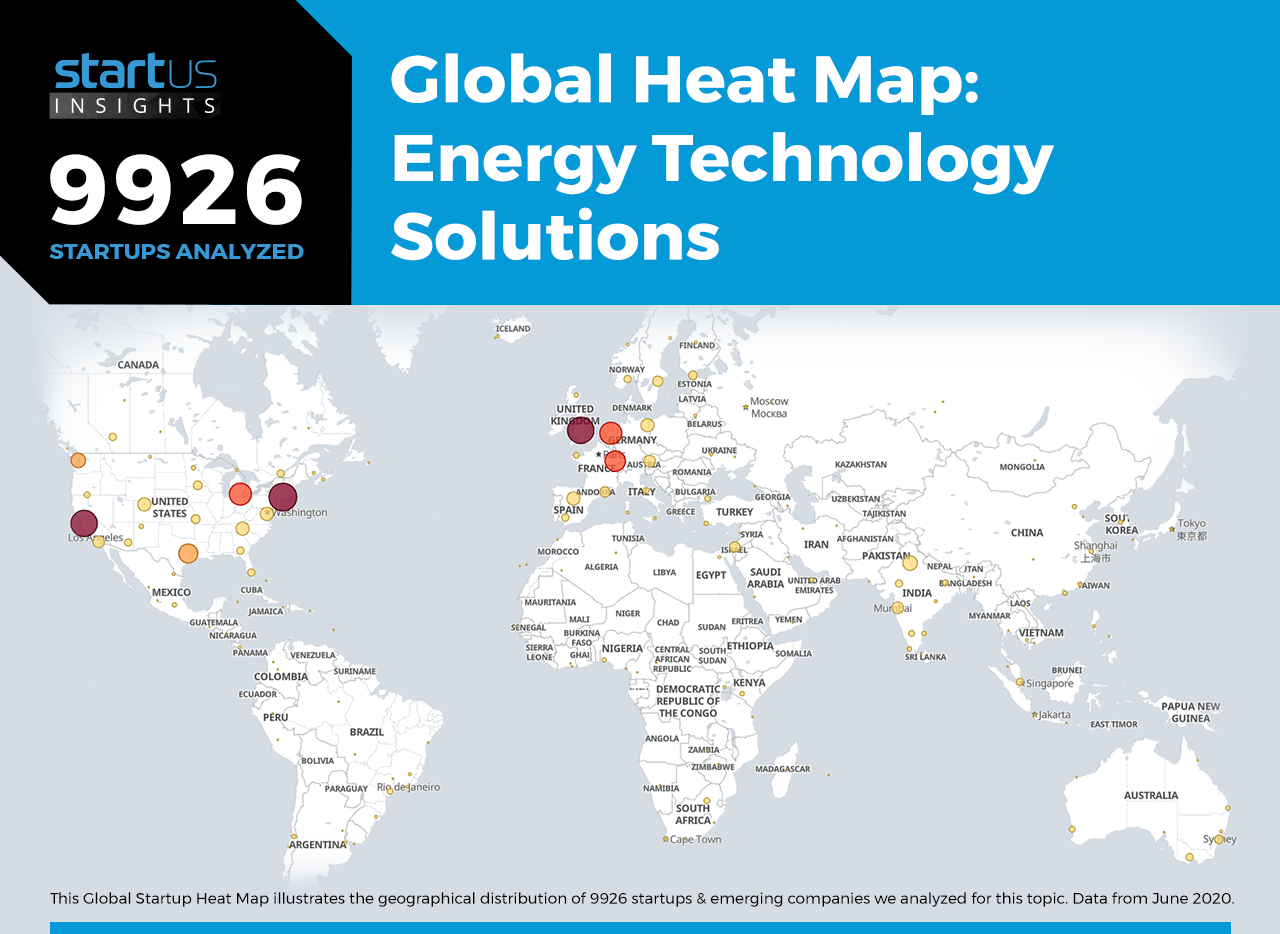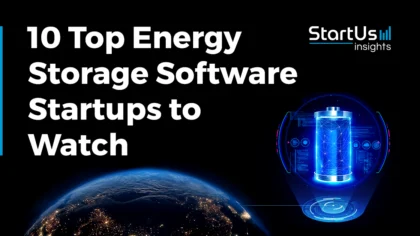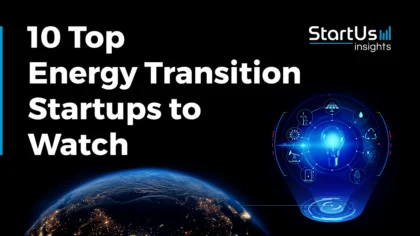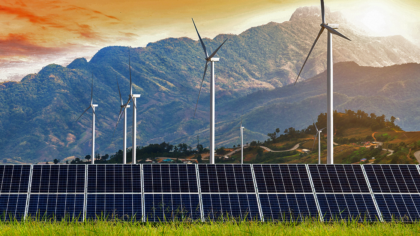Accelerate Productivity in 2025
Reignite Growth Despite the Global Slowdown
The United Nations’ 17 Sustainable Development Goals (SDGs) aim to foster global sustainable development by 2030. In this endeavor, both entrepreneurs and established companies are increasingly focusing on advancing energy technology solutions to meet these goals. In this article, we highlight the key innovation areas and the role of energy tech startups in developing these technologies. Leveraging our Discovery Platform, which covers over 3.7 million startups and scaleups globally, we provide highly relevant solutions contributing to the UN SDGs. Specifically, we analyzed 9962 startups and emerging companies working on innovative energy technologies aligned with the UN’s SDGs
Innovations in Energy: 2024 & Beyond
The major innovation trends in the energy sector involve improvements in renewables, energy storage, and energy efficiency. For all energy stakeholders like utility companies and governments, adopting renewable energy continues to dominate conversations and policy. Secure trading of energy credits using Blockchain incentivizes further adoption of renewable resources for the larger public. Energy technology startups and emerging companies also see Distributed Energy Resources (DERs) management and microgrids as important areas for innovation and advancement.
The SDGs for achieving clean and affordable energy for all focus broadly on three major areas. First, they promote and encourage the use of modern technology to make electricity supply more reliable and affordable for all. Second, they work with several governments to help them increase the share of renewables in their total energy mix. Finally, they aim to double the global rate of improvement in energy efficiency by 2030.
Our Energy Innovation Map covers all major technologies and solutions impacting the energy sector right now. Our goal is to showcase energy technology startups that are working on solutions that accelerate the progress of achieving the UN SDG 7 – Clean & Affordable Energy.
Global Heat Map: Discover Energy Technology Solutions
We analyzed 9926 energy technology startups and emerging companies working on solutions for the energy sector that are highly relevant for accelerating the progress of the seventh SDG of ‘Clean & Affordable Energy For All’. The Global Heat Map below highlights the geographic distribution of all the companies we analyzed for this research.
Exploring 19 Cutting-Edge Technologies in Energy Tech Innovation
Additive Manufacturing
The energy sector utilizes several machinery and infrastructure that are essential for power generation and transmission. 3D printing, or additive manufacturing, solves multiple challenges faced by energy players. By enabling on-site printing of parts and equipment that have been through wear and tear, energy companies save time and reduce interruptions to the power supply. Moreover, 3D printing is sometimes less expensive in comparison to conventional manufacturing, making energy generation more accessible and affordable.
The ever-growing demand for electricity causes expensive breakdowns and power outages. The UN stresses the need for access to reliable sources of energy. Careful monitoring of energy infrastructure allows engineers to identify faulty parts in advance, so as to maintain uninterrupted power supply, by printing them on-demand and at the same location.
1. RCAM Technologies
Based out of Irvine in California, USA, RCAM Technologies is a startup that manufactures ultra-tall wind turbine towers and offshore wind energy infrastructure using 3D concrete printing technology. Some of their recent projects include on-site additive manufacturing of wind turbines and lowering the cost of offshore wind support structures as an alternative to heavy-lift vessels.
Asset Management
Nowadays, energy asset management goes beyond basic infrastructure monitoring. Asset managers provide energy clients with financial and risk management, operations, and performance tracking, as well as environmental risk assessments. With smart and connected energy systems growing in popularity, cybersecurity also plays an important role in managing energy assets.
Without adding specific numbers, the UN wants to substantially increase the share of renewables in the global energy mix by 2030. With a growing number of renewable sources of energy being added to the grid, distribution and management become key to ensure uninterrupted power supply.
2. CyberX Labs
CyberX Labs is an emerging company from the United States developing cybersecurity solutions for the energy sector. They provide continuous monitoring and vulnerability management for control centers and substations. Their platform is capable of detecting a wide range of threats, including industrial malware, operational malfunctions, and disruptive targeted attacks.
3. Laserpas
Laserpas is a Lithuanian startup based out of Vilnius. They employ a custom-built helicopter-mounted inspection platform that uses an array of sensors, capable of providing operators with the data they need to make informed, data-driven decisions. Their solution allows for time-saving and cost-effective maintenance planning while, in turn, allowing utility operators to channel investments into areas requiring immediate attention.
Augmented Reality (AR)
The engineering involved in operationalizing power plants is complex and requires careful supervision of various components. Often, these power plants are constructed further away from the commercial offices of the company. Augmented Reality allows experts to guide local engineers at the plant while they perform maintenance and repair tasks. In addition, AR facilitates plant design optimizations and improves training outcomes for workers.
The UN encourages the development of modern and reliable technologies to improve the quality of power supply for millions of people around the world. By training more local engineers and troubleshooting unexpected events remotely, AR potentially reduces the number of power outages and machine breakdowns.
4. V-Labs
Swiss startup V-Labs develops an AR headset primarily for surveyors and contractors. Their solution visualizes and overlays complex GIS data onto work sites. This enables electricity providers to accurately place cables and wires underground. With haphazard urban development across much of Asia, this solution potentially enables local governments to provide uninterrupted power supply to their residents.
Big Data & Advanced Analytics
Power plants currently generate vast amounts of data, of which a majority remains to be collected. Bringing one company’s energy assets data into one platform poses several data quality challenges. However, companies that use big data techniques enable data collection and apply advanced analytics on them to optimize and maintain their assets.
One of the goals the UN has set is to promote higher investment in energy infrastructure and related areas. Data collection enables key energy quality improvements such as implementing predictive maintenance or developing contingency strategies.
5. VIA
The US-based startup VIA develops TAC, Trusted Analytics Chain, that securely connects confidential data, distributed across many locations, to potential artificial intelligence (AI)-enabled solutions. Their solution enables virtual data pooling for a company, and also for multiple companies to anonymously analyze larger datasets. With 10 patents pending for approval, VIA uses blockchain and AI to help energy providers reduce their transmission and distribution costs.
6. Enerlytics
Based out of Ahmedabad, Enerlytics is an Indian startup developing complete data collection and analysis solutions for renewable energy providers. Enerlytics Link is a hardware that is provided to collect data from various locations. It sends the data to their Enerlytics portal that provides a dashboard for users to respond to any anomalies in the operations of the power facility. Their flagship product is a rooftop solar monitoring solution.
Blockchain
For the energy industry, blockchain technology potentially plays a significant role in incentivizing greater adoption of renewables. Its ability to secure, encrypt, and provide transparent information about energy trading makes it a valuable asset in achieving sustainability targets.
The UN supports research and development for various energy-related areas, of which renewable energy production is a major part. Startups and emerging companies employ blockchain to facilitate wider renewable energy use. By observing the results, the UN aims to transfer the knowledge to several developing nations, helping them manage their financial and energy resources more efficiently.
7. Power Ledger
Australian startup Power Ledger develops smart ledgers using blockchain and offers renewable energy providers and users with three main solutions. Their energy trading platform allows users with rooftop solar or battery storage to buy and sell their electricity. They provide greater transparency to environmental commodities trading and renewable energy credits. They also develop an asset ownership model that allows socio-economically poor households to benefit from renewable energy assets.
Internet of Energy
For the energy sector, sensors collect data about energy generation, consumption, and distribution that enables important interventions during times of congested networks or even before such issues arise. From smart meters for homes to grid optimization for industrial energy facilities, the internet of energy creates several opportunities for energy stakeholders to streamline utilization and maintenance.
The UN aims to double the rate of improvement for energy efficiency by 2030. To enable such an advancement, startups and emerging companies focus on developing the internet of energy solutions to first track and understand where efficiencies can be achieved.
8. Sympower
Dutch startup Sympower develops holistic energy management solutions for various industry stakeholders using AI and the internet of things (IoT). They offer real-time balancing of supply and demand for electricity on the grid. In addition, they work with distribution system operators (DSOs) to investigate and mitigate local congestion issues. Users integrate their existing IoT solution with the Sympower platform or decide to use the Sympower IoT hardware as well. They continuously monitor energy assets to present users with insights on energy consumption and utility frequency.
9. Bandora Systems
Portuguese startup Bandora Systems develops autonomous building operation solutions using AI, machine learning, and IoT. They leverage AI in order to predict energy consumption, indoor temperature, level of comfort, occupancy, and malfunctions. Bandora.OM is a building management system (BMS), IoT device-agnostic, and is designed to complement existing investments in building automation systems.
Renewable Energy
The key discussions in many nations regarding energy policy today involve investing in renewable sources of energy. Solar, wind, geothermal, and other innovative renewable energy solutions have the potential to severely disrupt conventional utility players. Renewables are cheaper to install and operate in the long term and offer opportunities to reduce the dependency on fossil fuels.
The UN estimates that in 2019, more than 800 million people around the world still had no access to electricity. Policymakers have begun to allocate huge sums of money for solar and wind energy solutions to provide electricity to all their citizens. Renewables also play an important role in achieving climate targets, but the UN believes the current rate of renewables adoption will be insufficient to meet the goal. In addition, the UN also looks for innovations in cleaner fossil fuel technology.
10. Biohack
Brazillian startup Biohack offers clients a range of green technology and sustainability solutions. They help companies assess their greenhouse gas emissions and further assist them in employing abatement strategies. They also offer an alternative fuel for energy, biocoal, which is a renewable and clean fuel that is derived from residual biomass. The use of biocoal enables the reduction in greenhouse emissions compared to fossil fuels.
11. Inecosolar
Indonesian startup Inecosolar designs, sources, and installs solar PV systems for residential and commercial establishments. They offer users the option of trading excess electricity generated from rooftop solar installations with the existing grid. In addition, they offer battery storage options that help users manage unexpected power outages.
12. Trusted RECs
Singaporean startup Trusted RECs utilizes and combines AI, Blockchain, and smart metering technologies to provide clients with secure Renewable Energy Certificates (RECs). These RECs track and validate the production of 1 MWh of renewable energy by any renewable source such as solar, hydro, and wind. Purchasing RECs helps companies to achieve the goal of being carbon-neutral, so big corporations use this approach in order to meet their sustainability targets.
Decentralization
As cities continue to expand rapidly around the globe, energy demand already exceeds supply. Microgrids and decentralized energy solutions allow remote locations and low power transmission regions to be electrified. Startups and emerging companies develop innovative ways to decentralize power production while allowing users to centrally manage power distribution.
According to the UN, somewhere between 18 and 25 percent of the energy produced in the world today uses renewables. With only a minimal rise in the share of total consumption since 2010, countries are urged to expand their renewables capacities. China, the EU, and India see accelerated activity, especially in solar, over the last 2 years, mainly due to government policy.
13. Brightmerge
Brightmerge is an Israeli startup developing an enterprise software-as-a-service (SaaS) platform based on proprietary machine learning and big data algorithms. Their solution automates and optimizes the design, development, build, and operation of energy microgrid systems. They take advantage of reduced on-site generation and storage costs to further reduce the financial impacts of power outages. They also believe Moreover, decentralized renewable energy generation is more sustainable for the industry and the environment.
Distributed Energy Resources (DERs)
For many developing countries, distributed on-site power generation using smaller energy facilities potentially allows stakeholders to provide more people with access to electricity. Startups and emerging companies develop DERs management and implementation solutions. Increasingly, on-site power generation also addresses the heating, cooling, and other needs of users, apart from providing electricity.
According to the UN, energy is crucial for achieving almost all of the SDGs, from its role in the eradication of poverty through advancements in health, education, water supply, and industrialization, to combating climate change. Distributed Energy Resources potentially help smaller and remote regions generate and consume clean energy until such time that they are connected to national grids.
14. Gaia Wind
Revived in 2018 by new owners, Scottish startup Gaia Wind develops low noise small wind turbines to provide energy to farms, rural properties, businesses, and community projects. One of the main features of their small wind generator is the control system, developed from controllers used on utility-scale wind turbines, which makes their system more reliable. The system contains multiple sensors that continuously monitor the status and performance of the machine. Designed to operate efficiently at moderate annual wind speeds of 4.5 m/s -7.5 m/s, the GW133 helps stakeholders reduce energy costs along with their carbon footprint.
15. SALT Energy Group
The US-based clean energy startup SALT Energy develops power generation sites by employing multiple generation technologies that aim to take industrial facilities primarily off-line, with the electrical grid acting as a backup, rather than its primary source of power. This saves stakeholders money and increases the security of their infrastructure. They produce energy using solar, geothermal, and combined-cycle fuel cell energy technologies. In addition, they develop a series of small Combined Heat and Power (CHP) facilities in the northeast corridor, primarily in and around New York City.
Electric Mobility
After renewable energy, electric vehicles (EVs) dominate conversations about future mobility, despite hybrids being in existence for decades now. We observe a large number of startups and emerging companies developing innovative electric mobility solutions from cars, fleets, and VTOLs to electric public transportation and smart charging solutions.
Electric vehicles, especially those that gather energy from renewable sources, reduce a country’s reliance on traditional fossil fuels only when there is wide public adoption. One of the key UN targets is to raise the share of renewables in total energy consumption. EVs potentially allow a large and polluting section of the population to move around – without gradually damaging the environment.
16. TVINN
EV and EV charging infrastructure providers face difficult challenges while trying to integrate renewables into everyday mobility. Swedish startup TVINN develops an AI-enhanced optimization software designed to charge electric fleets. Their comprehensive solution looks to produce energy locally and store it on-site or in vehicles, with the main goal of charging fleets. Using a centralized data platform, they integrate external and internal energy requirements to optimize energy flows to aid the buying or selling of stored or produced energy.
17. Easelink
Austrian startup Easelink designs and develops the Matrix Charging system for electric vehicles. Made of three main components: a smart charging pad that is placed along parking lots, a compact charging connector that is attached under the vehicle, and a smartphone application to authenticate and begin charging. An intelligent charging management system allows for automated charging when an equipped vehicle parks over their pad that has no moving parts. With a charging power of up to 22kW AC and high power DC, Easelink offers minimal to zero maintenance requirements for their systems.
18. Furo Systems
UK startup Furo Systems develops light-weight foldable electric bicycles. They employ a compact torque-sensing BOFEILI 250W mid-motor along with a removable lithium-ion battery, onboard computer and backlit display, and hydraulic disk brakes. Looking like a regular cycle, the compact electric battery allows for greater riding comfort and innovative design makes it highly portable. Though it may be a simple technology solution, it potentially reduces distances dramatically for rural and remote hillsides, while reducing two-wheeler pollution and congestion in urban cities around the world.
Energy-as-a-Service
Electricity supply requirements have changed over the years from simple power lines for homes to emerging companies developing wireless charging technologies for all sorts of electric vehicles and other applications. Today, startups offer energy as a service to extract the full benefits of integrating and optimizing renewable grids with traditional national grids. Usually, in the form of energy subscriptions, such models allow many people to benefit from power generation without spending a lot of individual upfront capital.
By 2030, the UN wants the developing and least developing nations to expand infrastructure and upgrade technology for supplying modern and sustainable energy services for all. Emerging solutions in energy services potentially provide access to innovative energy technologies that can be rapidly deployed to benefit small and neglected communities.
19. Elivere Solar
Spanish startup Elivere Solar develops a suite of energy as a service (EaaS) solution for domestic and industrial purposes. They install solar energy equipment, as well as monitor, track, and analyze solar power generation and consumption. Their solutions range from small projects like solar-powered street lighting to large-scale PV power plants that offer trading excess or stored energy back to the grid. In addition, they offer EV charging facilities for public spaces and for homes and irrigation services for integrated utility parks.
Grid Management
As the total share of renewables as a part of the total energy mix rises, it becomes essential to connect, adapt, and manage existing grids to integrate renewable energy seamlessly. Startups and emerging companies develop solutions that help distribution grid operators include the numerous PV panels and wind turbines installations as they start generating power.
The UN expects universal access to affordable, reliable, and modern energy services by 2030. Grid management plays a very important role in ensuring all parts of a country have access to electricity. As more emerging solutions make it cheaper and simpler to install and generate renewable energy, utility providers look towards technology for optimizing and streamlining energy distribution.
20. envelio
German startup envelio is a clean energy technology startup developing an Intelligent Grid Platform (IGP) to streamline power grids. The IGP is a digital assistance system for grid distributors that uses machine learning, Big Data analytics, and optimization algorithms. The system supports distribution grid operators by helping them with the planning and operations of power systems that have a high share of renewables.
Kinetic Energy Utilization
For cities, especially in districts with maximum footfall per day, kinetic energy generated by vehicles and pedestrians currently remains heavily underutilized. Advancements in technology, combined with startups willing to take the risk, results in viable and useful ways to harness the kinetic energy present in such locations.
In many cities across the world, both big and small, power outages and unreliable power supply hamper development efforts in other areas. This SDG aims to provide universal access to energy resources in order to fight poverty and climate change, improve education and health services while improving the reliability of the power supply. Deeper research and development of kinetic energy utilization allows stakeholders to improve electricity supply during peak hours while adding more regions into the grid.
21. Kinetech Power Systems
Mexican startup Kinetech Power Systems develops innovative mechanical batteries that provide non-toxic, environmentally-friendly power for up to 30 years. Their Flywheel Energy Storage System (FESS) is developed using proprietary design and employs a high-speed hybrid composite flywheel system. In addition, the solution comes with a low-cost and low maintenance requirements.
Prosumers Support
Households and businesses that produce and consume their own energy are known as prosumers. This group of energy users is still connected to national grids as they may or may not meet all their energy needs from their own sources. However, by relying less on the grid for everyday power consumption, prosumers are able to reduce their electricity costs, or even make money by trading excess energy.
Prosumers already contribute towards the UN’s SDG of clean energy as the energy they produce is usually from solar, wind, or other renewable sources. As more consumers make the transition into prosumers, the electricity grid becomes less burdened and potentially provides reliable power to remote places.
22. FlexThor
Belgian startup FlexThor creates patented battery storage solutions for prosumer and commercial solar installations. They incorporate an Internet of Things (IoT) platform and machine learning techniques with battery storage to maximize the cost savings for photovoltaics (PV) and help stakeholders decrease energy waste. The solution encourages the self-consumption of energy.
Energy Efficiency
Efficient energy use is one of the fastest and cheapest ways to significantly reduce human dependence on fossil fuels. By limiting the amount of energy loss, using novel technologies, and simple insulation techniques, users achieve lower energy costs and also emit lower amounts of greenhouse gases. Startups use emerging technologies to reduce energy wastage and make energy affordable for more people.
The UN measures the energy intensity of a country to determine the targets for this SDG. By aiming to double the rate of energy efficiency, they allow high energy intensity countries to employ technology to improve efficiencies and low energy intensity countries to bring more of their populations into the energy grid.
23. Freschfield
Based out of Nashville in the US, Freschfield is a startup that designs, builds, owns, and operates microgrids. Their Quantum Grid energy generating systems combine and integrate with battery storage systems in order to monitor, control, and dispatch generating resources. They also optimize energy cluster exchanges and green energy trading across a distributed ledger using smart contracts. The company develops iSkin, an energy-producing cladding system, built for new buildings and retrofits, that uses quantum semiconductor technologies to generate considerably higher amounts of power.
24. WindFarmDesigns
Norwegian startup Wind Farm Designs aims to amplify energy generation while moderating loads by utilizing a web-based layout optimization solution, named WFD ParkOptimizer. Their proprietary optimization algorithms process Computational Fluid Dynamics (CFD) data and create the International Electrotechnical Commission (IEC)-compliant wind maps for increased energy yield and profitability of wind projects.
Energy Storage
One of the most crucial areas for developing reliable sustainable energy is by improving energy storage. From utilizing new materials and processes to developing viable large-scale energy storage solutions, startups, and emerging companies work with a wide variety of technologies. Increasing interest in smart energy storage systems from consumers also creates numerous opportunities for the development of clean and affordable energy.
Large parts of the world still have limited to no access to electricity. The UN wants to reduce energy intensity by an annual rate of 3% in order to achieve targets for this SDG. One of the major obstacles preventing further mass adoption of renewable energy sources remains the existing capacity of energy storage solutions. By focusing on smarter, cheaper, and longer-term energy storage solutions, multiple SDGs also benefit significantly in reaching their targets.
25. Nikola Power
Denver-based energy technology startup Nikola Power builds control software for energy systems utilizing a combination of batteries, solar, and grid power. They enable energy project developers, EPCs, and asset owners to effectively optimize and manage commercial-scale batteries. Their Ratio tool is a web-based application that models solar, storage, and solar + storage projects. Using advanced analytics, it determines the optimal size of a battery asset and critical financial outputs.
26. Plug The Sun
In 2016, Enerray and Fastpower entered into a joint venture that resulted in establishing Plug The Sun. The company develops, manufactures, and integrates off-grid solar energy solutions. They partner with local distributors, energy providers, project developers, and governments to offer new solutions for rural electrification. Their range of innovative solutions includes energy solutions to isolated villages using their integrated solar battery systems. In addition, they offer PV systems in combination with existing generators and single off-grid electric water pumps.
Batteries
Advancements in battery technology are crucial for meeting the energy intensity targets of the SDG by 2030. Batteries allow owners to store energy batteries to use or trade later while enabling them to become less reliant on the primary energy grid. From electric car batteries to supplementary residential, commercial, and industrial batteries, improving their efficiency and cost is the key focus for many startups and emerging companies.
The UN tracks government investment in energy efficiency, as a share of their GDP, to define the success of achieving broader sustainability targets. This includes investments in energy technology or infrastructure, both of which are essential for ensuring reliable and affordable power supply for all countries, including small island nations and some of the least developing countries.
27. Geyser Batteries
Finnish startup Geyser Batteries develops energy storage solutions for heavy machinery, transportation, and the power grid, including renewables. Their batteries employ bipolar design and aqueous electrolytes in order to enable cost-effective and carbon-neutral manufacturing. In addition, the startup, in cooperation with resources of the Nordic energy cluster, works to launch high-volume manufacturing of safe and sustainable high-performance batteries.
28. RFC Power
British startup RFC Power develops new classes of low-cost redox flow batteries by leveraging concepts from fuel cells. Their patented hydrogen-manganese system combines optimized cell architecture with low-cost chemistry. Their system has benefits that improve upon existing technologies in terms of such as single-cell voltage, power density, long cycle-life, and capital costs. In addition, these flow batteries’ electrolyte system is based on non-toxic and abundant materials.
29. ANDESVOLT
Chilean startup ANDESVOLT manufactures lithium-based batteries as portable autonomous power stations. Their batteries allow charging from different sources such as from the main grid, diesel generators, PV systems, and wind turbines. Further, the startup enables smart microgrid management services that detect power outages and accordingly supply energy stored in their batteries as a supplement.
Waste To Energy
The large amounts of waste human beings generate, and the inefficient management of the same drives innovation in waste management. One area of innovation is converting waste into energy, which significantly reduces the amount of waste burnt in landfills. Startups use novel technologies to convert waste, especially plastics, into energy sources like crude oil, sulfur diesel, and gases, to name a few.
Waste management cuts across several of the UN SDGs from providing access to good health and industrial innovation to building smarter cities and eradicating poverty. Local regions generate varied types of waste, requiring stakeholders to focus on regional investments in waste to energy conversion technologies. This SDG encourages stakeholders to increase and distribute energy investments across the world.
30. RAYS ENSERV
Indian startup RAYS ENSERV develops its proprietary Advance Supercritical Thermal Treatment Technology (AST3) for the conversion of large molecular-weight polymers into small molecular-weight synthetic oil, synthetic gas, or residual char, under an oxygen-free environment. They recycle plastic waste such as HDPE, LLDPE, LDPE, PP, and PS to use in their process. These synthetic products contain almost no sulfur or heavy metal contents, making them a viable alternative fuel when compared with conventional fossil fuels.
31. Biofuel Evolution
Biofuel Evolution, a pioneering startup in biotechnology and cleantech, addresses waste at its root by combining compositional analyses and data analytics with bioengineering. Their flagship solution, BEBlock, is a decentralized waste-management system that uses novel biological engineering technologies to convert food waste and CO2 into biofuels and bioenergy tailored for local communities and organisations in the process industries.
Power To X
Another emerging suite of technology-driven energy solutions is the conversion of power into various end products, based on the use. For example, reducing global demand for petrol and diesel by converting power to mobility, by rapidly expanding electric vehicle adoption and infrastructure. Startups and emerging companies focus on various applications of converting electricity for heating, cooling, fuels, and reducing greenhouse gas emissions.
As people start using electricity for most of their daily requirements, it allows governments and power companies to focus their efforts on streamlining electricity access. This also helps limit government funding in crude oil to electricity generation, without the added pressure of vehicles and generators also requiring using crude oil. Novel power conversion technologies make energy more reliable and affordable.
32. E-Energy
Luxembourg-based startup E-Energy develops novel proprietary biorefinery technology with the aim of reducing carbon emissions and dependence on fossil fuels. They produce green hydrogen using only biological waste and e-fuels by converting waste into crude oil. In addition, they convert and integrate biological waste into different types of biochar with fertilizers, depollute heavy metals, and are used in water filters. Their solutions also integrate easily with existing value-chains.
What’s Next in Energy Tech Innovation?
The journey towards the Sustainable Development Goals requires collective effort. Energy technology startups are at the forefront, pioneering in areas like decarbonization, decentralization, and digitization of energy resources. Their innovations are reshaping everything from renewable energy generation to smart energy management and electric mobility.
As the number of startups aligning with these goals grows, it’s clear that the momentum is building. This is where you can play a role. Join us in this transformative journey. Connect with us to explore how your business can collaborate with cutting-edge energy tech startups and contribute to achieving a sustainable future for all.
